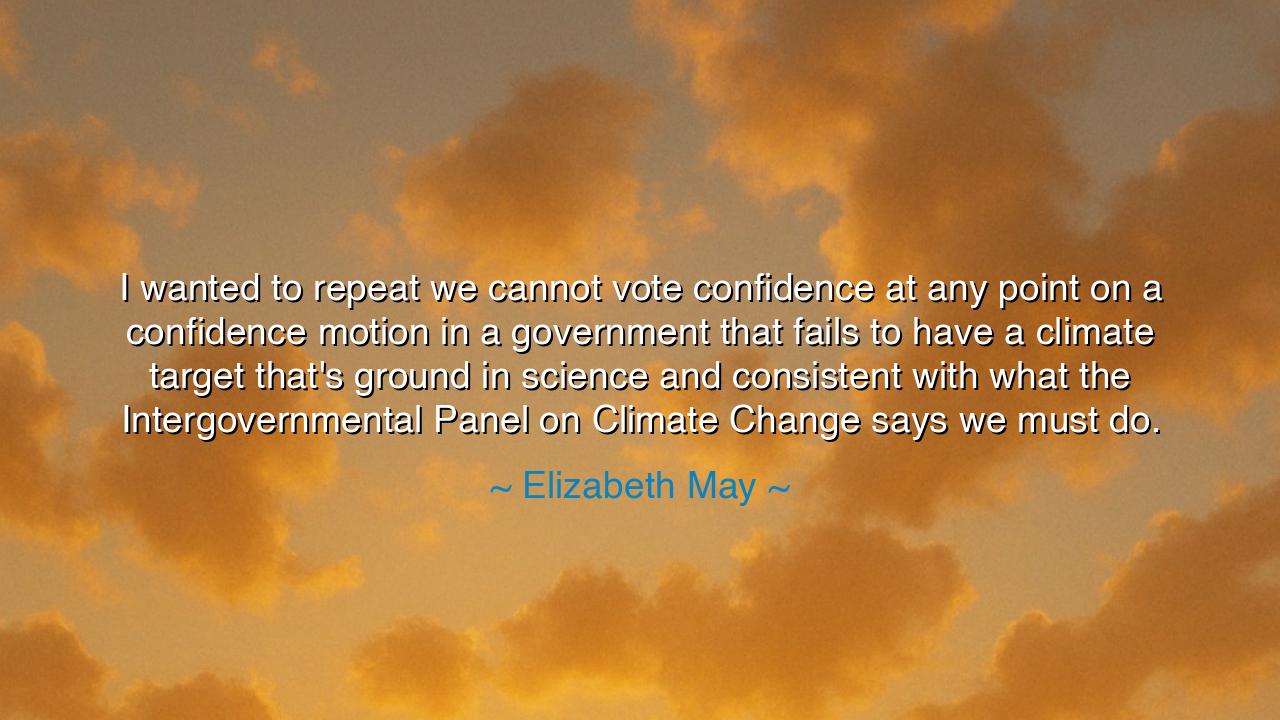
I wanted to repeat we cannot vote confidence at any point on a
I wanted to repeat we cannot vote confidence at any point on a confidence motion in a government that fails to have a climate target that's ground in science and consistent with what the Intergovernmental Panel on Climate Change says we must do.






“I wanted to repeat we cannot vote confidence at any point on a confidence motion in a government that fails to have a climate target that's grounded in science and consistent with what the Intergovernmental Panel on Climate Change says we must do.” Thus spoke Elizabeth May, a voice both fierce and unwavering, who stood in defense of the earth when many had grown deaf to its cries. In these words, she summons the ancient and eternal principle that leaders are not merely the stewards of nations — they are the guardians of the world itself. Her declaration is not one of politics alone, but of conscience. She reminds us that a government that ignores the laws of nature and the warnings of science forfeits its right to moral authority, for it has betrayed the future it was sworn to protect.
The origin of this quote lies in the modern age’s most perilous conflict — not between nations, but between humanity and its own excess. Elizabeth May, leader of Canada’s Green Party, spoke these words within the halls of Parliament, addressing the grave failure of governments to align their climate targets with the scientific demands set forth by the Intergovernmental Panel on Climate Change (IPCC). The IPCC had long warned that the window to limit global warming to safe levels was closing rapidly. To May, this was not a matter for negotiation, compromise, or political maneuvering. The science was clear, and therefore the duty was sacred. To vote “confidence” in a government that ignored this truth would be to endorse its negligence — to participate in a betrayal not only of one’s people, but of the planet itself.
Her words — “grounded in science” and “consistent with what the IPCC says we must do” — ring like the counsel of an oracle reminding humanity that the laws of nature cannot be rewritten by decree. For centuries, kings and conquerors have defied justice, yet nature’s judgment is impartial and absolute. The floods, the fires, the melting of the ice — these are not political events, but cosmic reckonings. May’s insistence is that science is not opinion, but truth; and that leadership without truth is vanity. When governments act as if they can bargain with the atmosphere, they commit the oldest sin of humankind: arrogance against creation.
History, too, bears witness to such folly. Recall the tale of Easter Island, where the people, once prosperous, felled every tree to raise monuments to their own pride. They ignored the signs of depletion until their land was barren and their society fell into ruin. So too did the ancient Mesopotamians, whose irrigation poisoned their soil, and the Mayans, whose deforestation ushered in drought and collapse. Each civilization believed itself eternal; each was undone by its refusal to live in harmony with the earth. Elizabeth May’s warning is the echo of their ghosts — a reminder that no government, no empire, no people can stand against the immutable balance of nature.
But her statement is not one of despair; it is one of resolve. When she declares that she “cannot vote confidence” in a government without a scientific climate target, she calls upon all citizens to remember their own power and responsibility. Democracy, she reminds us, is not only a privilege — it is a covenant. To give our confidence to leaders who ignore science is to betray that covenant. Her words are a call to courage: that the measure of loyalty is not to the government of the moment, but to the generations yet to come. The climate crisis demands not compromise with convenience, but allegiance to truth.
Her defiance also speaks to the moral dimension of politics, often forgotten in the age of rhetoric and expediency. Politics, stripped of morality, becomes mere management of decline. But when guided by moral clarity — by the conviction that life itself is sacred — it becomes the instrument of renewal. May’s message is that governance must be rooted in integrity, that every policy must be tested against the question: does this preserve life, or diminish it? She transforms the act of voting from a procedural duty into a moral choice. To cast a vote of confidence in falsehood is to share its guilt; to stand firm in truth, even alone, is to keep the light of justice alive.
Therefore, O listener, take this teaching as a torch for your time. Let science be your compass, and conscience your guide. When those in power deny what is evident, speak as Elizabeth May spoke — with calm fire, with faith in truth above authority. Hold your governments to account, for the planet does not belong to them; it belongs to all who breathe and all who will be born. In your home, your work, your voice — act with reverence for the world that sustains you. For every small act of stewardship joins a greater chorus of healing.
And remember this: the earth will endure beyond the rise and fall of nations, but our place upon it is not guaranteed. The time will come when our descendants ask what we did when the world stood on the edge of fire. Let the answer be that we listened to the voices of wisdom — to those like Elizabeth May — who refused to place politics above truth, or comfort above duty. For in her defiance lies a lesson for all ages: that real leadership is not measured by the power to rule, but by the courage to protect.






AAdministratorAdministrator
Welcome, honored guests. Please leave a comment, we will respond soon